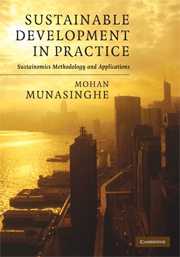Book contents
- Frontmatter
- Contents
- Foreword by James Gustave Speth
- Preface
- Part I Framework and fundamentals
- Part II Global and transnational applications
- Part III National and macroeconomic applications
- Part IV Sub-national sectoral and system applications
- 10 Energy-sector applications
- 11 Transport-sector applications
- 12 Water-resource applications
- 13 Ecological and agricultural system applications
- 14 Resource-pricing-policy applications
- Part V Project and local applications
- References
- Index
11 - Transport-sector applications
Published online by Cambridge University Press: 05 August 2012
- Frontmatter
- Contents
- Foreword by James Gustave Speth
- Preface
- Part I Framework and fundamentals
- Part II Global and transnational applications
- Part III National and macroeconomic applications
- Part IV Sub-national sectoral and system applications
- 10 Energy-sector applications
- 11 Transport-sector applications
- 12 Water-resource applications
- 13 Ecological and agricultural system applications
- 14 Resource-pricing-policy applications
- Part V Project and local applications
- References
- Index
Summary
This chapter continues our coverage of sustainomics applications to economic infrastructure sectors, focusing on transport (including fuel-pricing policy). Section 11.1 reviews generic priorities for sustainable transport, and discusses key issues worldwide, as well as economic, social and environmental linkages. Then we examine how transport policy could be made more sustainable in a typical developing country. In Section 11.2, health damage externalities due to transport-related air pollution in Sri Lanka are discussed, including a literature review, an estimation of damage costs from local air emissions using the benefit transfer method and finally an assessment of the specific health benefits of introducing unleaded petrol. Section 11.3 covers another classic externality – the effects of traffic congestion in the city of Colombo, including estimation of the cost of time wasted. Section 11.4 analyses several specific infrastructure projects and other measures for reducing congestion. The chapter concludes with Section 11.5, which provides an overview of sustainable transport policy options for Sri Lanka.
Generic priorities for sustainable transport
Sustainable transport is crucial for development as it provides access to jobs, health, education and other amenities, which determines the quality of life. Transport also provides physical access to resources and markets, which is essential for growth and poverty reduction. Poor transport policy could aggravate poverty, harm the environment, ignore the changing needs of users and overburden public finance. Several recent publications provide comprehensive expositions of sustainable transport and mobility, linked with the sustainomics framework and sustainable development triangle (SUMMA, 2003; World Bank, 1996c).
- Type
- Chapter
- Information
- Sustainable Development in PracticeSustainomics Methodology and Applications, pp. 355 - 390Publisher: Cambridge University PressPrint publication year: 2009



